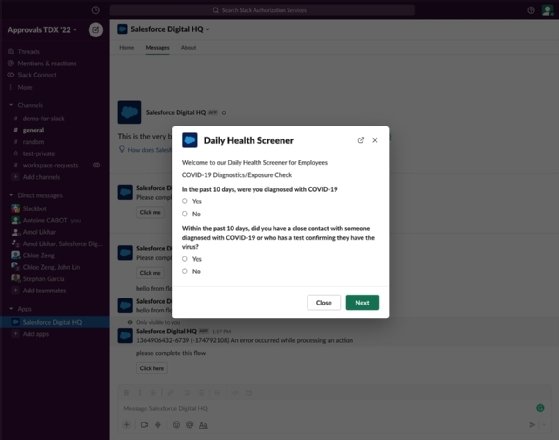
Getty Images/iStockphoto
Salesforce pushes automation for Slack
Salesforce's low-code automation tool Flow and programming language Apex will soon work on Slack. The company said the move will help workers avoid rote tasks.
Salesforce will make it easier for developers to automate tasks across Slack and its other products, aiming to bolster productivity by eliminating repetitive work.
The company will add its low-code automation tool Flow and an SDK for the Salesforce platform programming language Apex to Slack. The tools, available in beta this June, allow companies familiar with Salesforce's development tools to automatically trigger actions in Slack. By tying the collaboration tool more tightly with its application portfolio, Salesforce can differentiate Slack from competitors like Teams, industry observers said.
Salesforce executives said automation allows employees to focus on the important parts of their work, driving productivity and satisfaction. Such a boost is needed to retain employees at a time when people are increasingly willing to change jobs; a 2021 Gallup poll indicated 48% of Americans are searching for new employment.
"If you think about doing your own job, you probably hate having to constantly log into different systems in order to complete a task," said Patrick Stokes, a Salesforce vice president, in a press briefing. He noted that more than 1 trillion automations occur per month on the company's platform. "Automation is where a ton of innovation is happening."
With the addition of Flow, companies can use Salesforce data to initiate actions in Slack. For example, if a deal progresses to a new stage in Salesforce, an automated workflow could create a new channel in Slack, add the sales team members associated with negotiations and invite a member of the legal staff to start a review. Another workflow could send a notification after a meeting with a customer, prompting the sales team to consider next steps.
"People spend a significant amount of their day in Slack, so that's where users' attention is," said Slack executive Rob Seaman. "We can reduce [the need] to pop out of Slack … by bringing the information to them."

The Apex integration will allow Salesforce developers to create Slack apps using a language they already know. Companies have used Apex to build custom applications for things like expense reporting, customer onboarding and time management, Seaman said.
"They can now take those apps and make them Slack apps" without the need for middleware, he said.
These tools help Salesforce demonstrate Slack's value, according to Metrigy analyst Irwin Lazar. Many Salesforce customers have access to Teams as part of their Microsoft 365 subscriptions and may be hesitant to pay for Slack as well. A tight integration with Salesforce products could make a compelling case, he said.
"It's going to be so much easier to manage activities in Salesforce using Slack that it will get the Salesforce customer base to take another look at Slack," Lazar said.
Constellation Research analyst Dion Hinchcliffe said Salesforce sees Slack as a "collaborative glue" layer, in which employees can have focused discussions about getting work done in Salesforce apps.
"That is not enough to enable Salesforce to outcompete Teams … but it is a strong differentiator in terms of potential ROI," he said.
Salesforce bought Slack in 2020, and has been working steadily to integrate the collaboration tool with its other offerings since. The company has pitched Slack as a "digital headquarters" where hybrid, remote and in-person employees can communicate.
Mike Gleason is a reporter covering unified communications and collaboration tools. He previously covered communities in the MetroWest region of Massachusetts for the Milford Daily News, Walpole Times, Sharon Advocate and Medfield Press. He has also worked for newspapers in central Massachusetts and southwestern Vermont and served as a local editor for Patch. He can be found on Twitter at @MGleason_TT.




